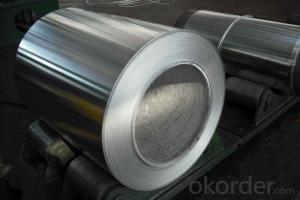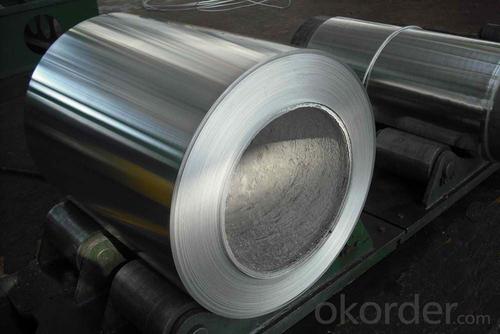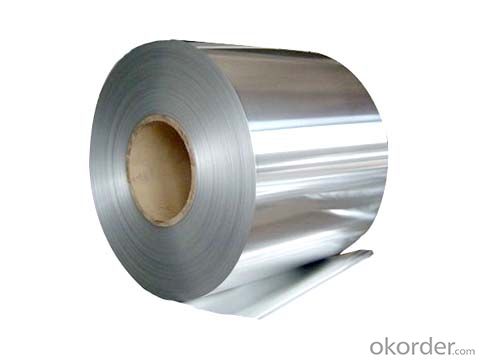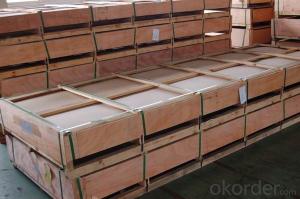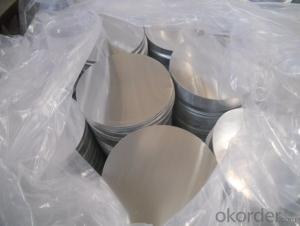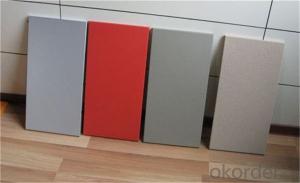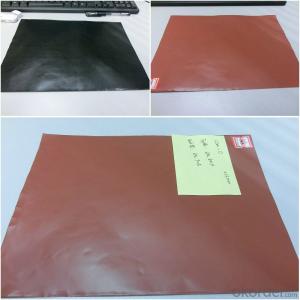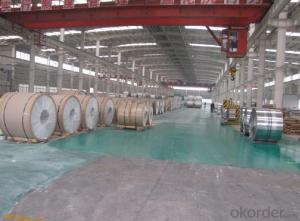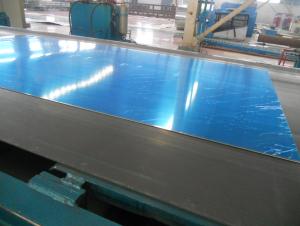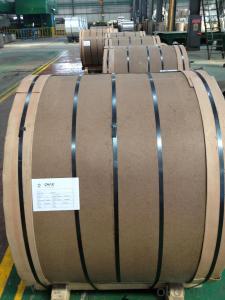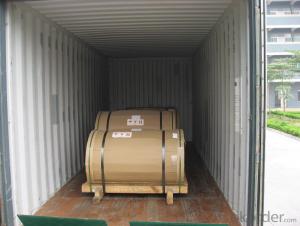Aluminum Foil Sheets Costco Grade Aluminium Coils for Rerolling Down Aluminium Foils
- Loading Port:
- Shanghai
- Payment Terms:
- TT OR LC
- Min Order Qty:
- 2 m.t.
- Supply Capability:
- 20000 m.t./month
OKorder Service Pledge
OKorder Financial Service
You Might Also Like
Specification
1.Structure of Aluminium Coils for Rerolling down Aluminium Foils
Aluminium Coils for Rerolling down Aluminium Foils is one semi-finished aluminium material. This strip can be rolled down to aluminium coil,sheet,circle ect. The alloy AA1050 is widly used in building, industry ect. Its weight is much lower than steel. So many customers choosed aluminium material instead of steel.
2. Main features of Aluminium Coils for Rerolling down Aluminium Foils
a.Competitive price---We have our own mills and can produce mill finished aluminium coils, so we can control the production cost better.
b.Professional after-sale service---We have more than 15 years exportation experience and you need not worry about the exporation problems.
c.Fast delivery time---We can control the delivery time within 35 days.
3. Image
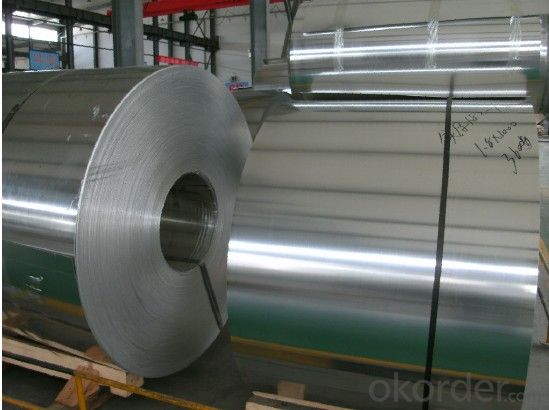
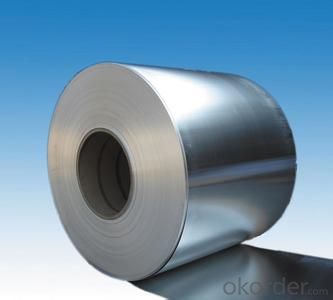
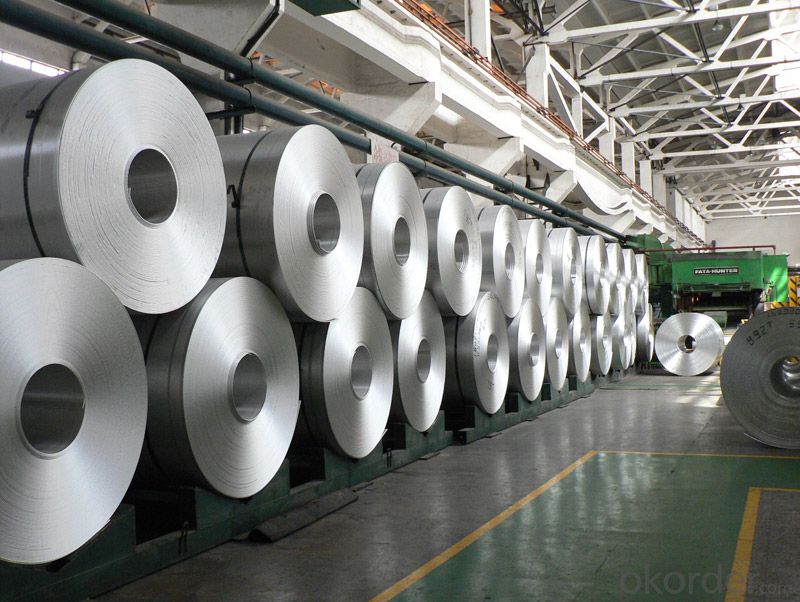
4. Product Specification
| Alloy | Temper | Thickness | Width | Weight |
| AA3003 | H14 | 0.2MM-3MM | 1000MM-1500MM | 2 TONS |
5.FAQ:
What is the quality standard?
---Usually our standard is GB3880-2006
What is the largest width?
---It is 2300mm
What is the MOQ?
---Usually we can accept 80 tons.
- Q: What kind of material is wood grain aluminum sheet?
- Wood grain aluminum plate itself is the main aluminum alloy,The surface of that wood grain should be paint or ink
- Q: why is aluminium used instead of copper for high voltage electrical cables????
- Aluminum would only make sense in low current applications where cost and weight are important.
- Q: Aluminum and oxygen gas react to produce aluminum oxide
- Aluminium oxide is Al2O3, so there are 3 oxygen atoms for every 2 aluminium atoms. Divide 75 by the relative atomic mass of oxygen (15.9994). That is proportional to the number of oxygen atoms. Then divide by 3 and multiply by 2. This gives a number proportional to the number of aluminium atoms. Then multiply this by the relative atomic mass of aluminium (26.981529) to give the mass of aluminium required in grams.
- Q: What specific considerations should be taken into account when using aluminum sheets in cold weather conditions?
- <p>In cold climates, aluminum sheets should be selected with consideration for their thermal expansion properties. It's important to use alloys with low thermal expansion coefficients to minimize distortion. Additionally, the design should account for potential contraction and expansion to prevent warping or cracking. Proper insulation and sealing are crucial to prevent condensation and moisture buildup, which can lead to corrosion. It's also advisable to use thicker sheets to enhance durability and resistance to the elements. Regular inspections and maintenance are recommended to ensure the longevity of aluminum structures in cold environments.</p>
- Q: How do you join two aluminum sheets together?
- There are several methods to join two aluminum sheets together. One common technique is using mechanical fasteners such as screws, rivets, or bolts. These fasteners can be drilled or punched through the sheets, creating a secure connection. Another method is using adhesives specifically designed for aluminum bonding. These adhesives provide a strong and durable bond between the two sheets. Welding is another popular option, where the aluminum sheets are melted and fused together using heat. This method requires specialized equipment and expertise. Lastly, a technique called clinching can be used, which involves applying pressure to deform the aluminum sheets and interlock them together. Each method has its own advantages and considerations, depending on the specific application and desired outcome.
- Q: Is it possible to use aluminum sheets for indoor purposes?
- <p>Yes, aluminum sheets can be used for indoor applications. They are commonly used in interior design for their durability, lightweight, and resistance to corrosion. Aluminum sheets are often utilized in the construction of furniture, decorative panels, and even as a material for interior walls and ceilings. Their ease of maintenance and ability to be recycled make them an environmentally friendly option for indoor use.</p>
- Q: Can 101 aluminum sheets be recycled?
- Yes, 101 aluminum sheets can be recycled.
- Q: What are the different bending techniques for aluminum sheets?
- There are several bending techniques that can be used for aluminum sheets. Some of the most commonly used techniques include: 1. Air bending: In this technique, a punch is used to apply force on the sheet, which causes it to bend along a straight line. The bend angle is determined by the amount of force applied. 2. Bottom bending: This technique involves clamping the sheet between a bottom tool and a die, while a punch is used to apply force on the sheet from the top. The sheet is bent around the die, resulting in a precise and consistent bend angle. 3. Coining: Coining is a technique in which the sheet is bent using a punch and a die, but with significantly higher force applied compared to other bending techniques. This creates a crisp and sharp bend with minimal springback. 4. Rotary bending: In rotary bending, the sheet is bent around a rotating bending roll. The roll exerts pressure on the sheet, causing it to bend gradually and smoothly. 5. Roll bending: This technique involves passing the aluminum sheet through a series of rollers, which gradually bend the sheet to the desired shape. It is often used for bending large sheets or for creating cylindrical shapes. 6. Press braking: Press braking is a versatile technique that uses a press brake machine to bend the sheet. The machine consists of a punch, a die, and a back gauge, which allows for precise and repeatable bends. Each bending technique has its own advantages and limitations, and the choice of technique depends on factors such as the desired bend angle, the thickness of the sheet, and the overall shape of the final product. It is important to carefully select the appropriate bending technique to ensure the desired result and avoid any defects or damage to the aluminum sheet.
- Q: 5052 aluminum plate and LY12 aluminum plate is the same?
- The 5052 series is aluminum magnesium alloy, the magnesium alloy belongs to the lower density alloy, the 5052 alloy aluminum plate density is 2.68
- Q: What are the advantages of using aluminum sheets in the furniture industry?
- Aluminum sheets have numerous benefits when utilized in the furniture industry. To begin with, their lightweight composition makes them easy to transport and install, reducing the overall weight of furniture and simplifying assembly or rearrangement. Moreover, their lightweight nature allows for increased design flexibility, enabling manufacturers to create intricate and distinctive furniture pieces. Additionally, aluminum sheets possess exceptional durability and corrosion resistance. Unlike materials such as wood or steel, aluminum does not rust or deteriorate over time, making it suitable for both indoor and outdoor furniture. This durability ensures that furniture constructed from aluminum sheets has a longer lifespan, reducing the need for frequent replacements. Furthermore, aluminum sheets possess high malleability, facilitating effortless shaping and customization. This design flexibility empowers furniture manufacturers to fabricate pieces with intricate patterns, curves, and contours. Aluminum sheets can be easily molded into various shapes and sizes, providing limitless possibilities for creativity and innovation in furniture design. Moreover, aluminum sheets require minimal maintenance. They are easy to clean and necessitate minimal upkeep, saving time and effort for both manufacturers and consumers. Consequently, aluminum sheets are an ideal choice for furniture in high-traffic areas or public spaces where regular cleaning is necessary. Furthermore, aluminum sheets contribute to environmental sustainability. Aluminum is a highly recyclable material, allowing furniture made from aluminum sheets to be easily recycled at the end of its life cycle. This reduces the environmental impact and promotes sustainability within the furniture industry. Lastly, aluminum sheets possess excellent thermal conductivity. Furniture constructed from aluminum sheets can efficiently absorb and dissipate heat, providing comfort to users. For applications such as outdoor furniture or items exposed to sunlight, aluminum sheets can prevent overheating and maintain a comfortable temperature. In conclusion, the advantages of using aluminum sheets in the furniture industry encompass their lightweight composition, durability, malleability, low maintenance, environmental friendliness, and excellent thermal conductivity. These properties have made aluminum sheets a popular choice among furniture manufacturers, enabling them to produce high-quality, innovative, and long-lasting furniture pieces.
Send your message to us
Aluminum Foil Sheets Costco Grade Aluminium Coils for Rerolling Down Aluminium Foils
- Loading Port:
- Shanghai
- Payment Terms:
- TT OR LC
- Min Order Qty:
- 2 m.t.
- Supply Capability:
- 20000 m.t./month
OKorder Service Pledge
OKorder Financial Service
Similar products
Hot products
Hot Searches
Related keywords
